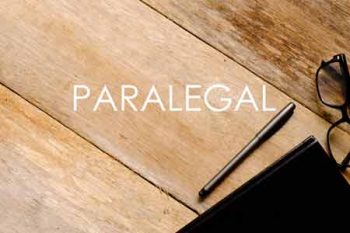Civil Litigation Paralegal
 There are numerous categories of law, and while many people might imagine intense legal dramas where someone shouts “I object!” in a courtroom, civil litigation is nothing like that. At Attorney Alternative our knowledgeable LDA (Legal Document Assistant) Regina Martinez has years of experience with civil litigation in which legal issues are disputed between two or more parties. Typically, one party is seeking monetary damages or specific performance as a resolution. While some cases may go to trial where a judge will decide the outcomes, it is not very common.
There are numerous categories of law, and while many people might imagine intense legal dramas where someone shouts “I object!” in a courtroom, civil litigation is nothing like that. At Attorney Alternative our knowledgeable LDA (Legal Document Assistant) Regina Martinez has years of experience with civil litigation in which legal issues are disputed between two or more parties. Typically, one party is seeking monetary damages or specific performance as a resolution. While some cases may go to trial where a judge will decide the outcomes, it is not very common.
There are many disputes that may require civil litigation, including:
-
- Divorce
- Product Liability
- Medical Malpractice
- Real Estate Disputes
- Construction Liability
- Personal Injury
- Workers Compensation Claims
- And More
Paralegals are essential to litigation procedures, and while they work under attorney supervision, they are tasked with performing various legal services. Some of these job duties include client interviews, drafting summons, complaints, and affidavits, and handling research-heavy tasks like the discovery phase.
Other paralegal services may include:
- Preparing Legal Documents
- Obtaining Police Reports
- Drafting Pre-Trial Disclosures
- Assisting With Jury Selection
- And More
Small Claims Lawsuit
The small claims court is a special court in which disputes are resolved inexpensively and quickly. The rules are simple. The hearing is informal. Attorneys are not allowed. (However, you may ask your lawyer for advice before you go to small claims court.)
The person who files the lawsuit is the plaintiff, and the person being sued is the defendant.
The plaintiff presents his or her side of the story to the judge. Witnesses or documents supporting the claim can also be presented.
The defendant is allowed to ask questions of anyone who testifies for the plaintiff. The defendant then presents his or her side of the case, and it is the plaintiff’s opportunity to ask questions.
The judge will usually decide on a verdict at the end of the trial.
As an individual, you can use Small Claims Court if your claim is for $10,000 or less. If you are an individual who owns a business (i.e., sole proprietor) and does business under a fictitious business name, you are considered to be an “individual” in Small Claims Court. For example, if you are a plumber doing business as ABC Plumbing and want to sue a customer who has not paid you, you can file a claim for up to $10,000. If your business is a corporation, partnership, or anything other than a sole proprietorship, your maximum claim amount is $5,000.
Civil Action
General civil cases typically involve disputes about contracts, damage to property, or someone getting hurt.
Civil cases are divided into types, depending on how much money is owed:
- A lawsuit for more than $25,000.00 is called an “unlimited” civil action. • A lawsuit for $25,000.00 or less is called a “limited” civil action.
- You can also file in Small Claims Court for $10,000.00 or less. If you are owed more than $10,000.00, you can waive the difference and file in Small Claims Court.
- A lawsuit that requires exceptional Judicial Management (see is called a “complex” civil action.
Legal Discovery
 The Discovery Act provides several tools for extracting information, narrowing issues, and preparing for trial. Each has its own function, purpose, advantage, and limitations. Recognizing these strengths and weaknesses will not only allow a party to use them effectively but will avoid frustration when they do not meet unrealistic expectations. It will also enable a party to design an effective discovery plan and to determine whether it is worthwhile to pursue discovery in court.
The Discovery Act provides several tools for extracting information, narrowing issues, and preparing for trial. Each has its own function, purpose, advantage, and limitations. Recognizing these strengths and weaknesses will not only allow a party to use them effectively but will avoid frustration when they do not meet unrealistic expectations. It will also enable a party to design an effective discovery plan and to determine whether it is worthwhile to pursue discovery in court.
DEPOSITIONS: oral exam of witness; generally proceed as at trial; limited objections
Advantages: spontaneity, use at trial, evaluate witnesses; follow-up questions and pin down witness; only means for discovery from nonparties
Disadvantages: only one person’s knowledge and testimony; no investigation
Corporate depositions achieve some of the advantages of written discovery, such as investigation and production of persons who can testify on more than one person’s knowledge
INSPECTIONS: inspect, copy, test, sample; documents, things & land;
Alternatives: by deposition or written request for production to party
INTERROGATORIES: written questions & answers for parties;
Advantages: the totality of knowledge; investigation required to answer; good for background material, contentions, identification of witnesses & documents
Disadvantages: lack spontaneity of depo, no cross-exam or quick follow-up, delay
ADMISSIONS: eliminate undisputed issues and establish facts and documents, investigation required to answer MEDICAL EXAMINATIONS when the condition in controversy & good cause is shown; reports EXPERT disclosure, discovery & deposition close to trial
DISCLAIMER
Information provided through this site has been taken from self-help informational publications provided by the Court or other legal sources believed to be reliable. This information is general, published, factual information and should not be cited on or relied on as legal authority, nor should it be considered legal advice. It is always recommended that you seek legal advice from an attorney before filing any legal proceedings. Many attorneys offer free consultations. I am not an attorney, I can only provide self-help services at your specific direction.
X201700023 Fresno County 04/24
